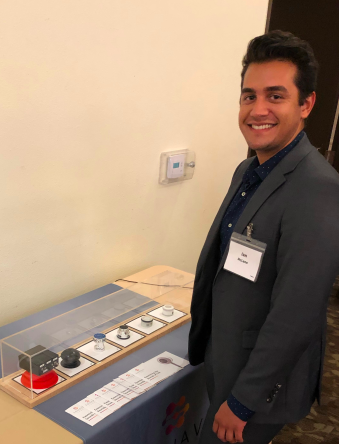Baltimore-based Sonavi Labs recently ticked off a key milestone for a medtech company on the path to commercialization: approval from the U.S. Food and Drug Administration.
The medical device clearance, known as 510(k) in regulatory parlance, is for the hardware portion of the company’s systems. Called Feelix, it enables the stethoscope that’s a familiar feature of any doctor’s visit to be used beyond the clinic. Designed to detect respiratory ailments, the device contains a microphone array and noise suppression technology.
“It removes ambient noises from any environment,” said Chief Business Development Officer Brandon Dottin-Haley.
With a goal of expanding access to medical care, Sonavi is planning to launch the Feelix system for use by community health workers and patients at home. A more advanced FeelixPro will be for clinicians of all skill levels.
The device was approved under an accelerated application process as part of a pilot called the Quality in 510(k) Review program. With FDA clearance, the device has been deemed safe for use, and can now be marketed in the U.S. As a result, the company is opening up preorders on Oct. 1. As it seeks to continue engaging in research, having the approval will also provide another level of validation as the company seeks to collaborate with other organizations on pilots, Dottin-Haley said.
The company also plans to seek additional FDA approval for its classification algorithms that work with the stethoscope as part of the system.
Six years in the making, the device was developed by Sonavi CTO Ian McLane. He was on a team at the Johns Hopkins Whiting School of Engineering’s West Lab that responded to a Bill and Melinda Gates Foundation challenge for new approaches to reducing child deaths due to pneumonia. They set out to create a device that could collect sounds outside of typical clinical settings. Eventually, McLane and CEO Ellington West spun the technology out of Hopkins to form Sonavi Labs and take the system to commercial use. The company has since taken part in ETC’s AccelerateBaltimore program, picked up notable pitch accolades and raised $1 million. It earned the #2 spot on our RealLIST Startups 2020.

While safety is a key focus of the FDA, Dottin-Haley said another focus in the commercialization process was on usability. The initial device started with a boxy console with knobs. Over a half-dozen iterations and work with firms like Pigtown’s Harbor Designs and Manufacturing, it now resembles a small handheld circle that’s evokes the traditional stethoscope. And the continuous cycle of iterating and improving continues.
“We’re still going to continue to make updates to the technology,” Dottin-Haley said. “This FDA approval is a first benchmark in this journey.”
For the five-member team based out of Pigtown’s 1100 Wicomico when public health guidance allows, the research also goes on even as it puts pieces in place to ramp up marketing and production. Through a National Institutes of Health-supported study with Hopkins called Feelix@Home, pediatric asthma patients are using the stethoscope device at their residences. Over six weeks of monitoring, the pilot is tracking changes in wheezes and lung sounds, with the aim of validating this use of the technology. Interestingly, it’s also comes at a time when healthcare is going increasingly remote.







